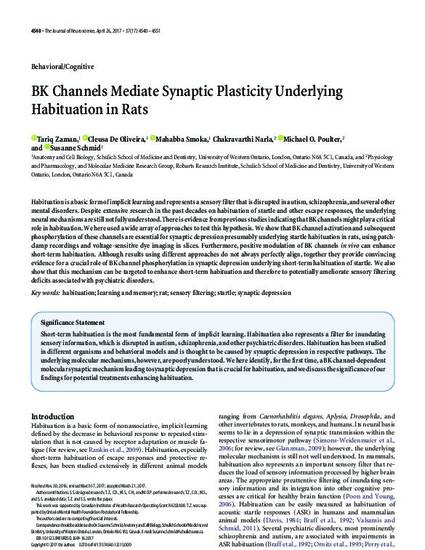
Article
BK Channels Mediate Synaptic Plasticity Underlying Habituation in Rats.
The Journal of neuroscience : the official journal of the Society for Neuroscience
Document Type
Article
Publication Date
4-26-2017
URL with Digital Object Identifier
10.1523/JNEUROSCI.3699-16.2017
Disciplines
Abstract
Habituation is a basic form of implicit learning and represents a sensory filter that is disrupted in autism, schizophrenia, and several other mental disorders. Despite extensive research in the past decades on habituation of startle and other escape responses, the underlying neural mechanisms are still not fully understood. There is evidence from previous studies indicating that BK channels might play a critical role in habituation. We here used a wide array of approaches to test this hypothesis. We show that BK channel activation and subsequent phosphorylation of these channels are essential for synaptic depression presumably underlying startle habituation in rats, using patch-clamp recordings and voltage-sensitive dye imaging in slices. Furthermore, positive modulation of BK channels
Creative Commons License
Creative Commons Attribution 4.0
Citation Information
Tariq Zaman, Cleusa De Oliveira, Mahabba Smoka, Chakravarthi Narla, et al.. "BK Channels Mediate Synaptic Plasticity Underlying Habituation in Rats." The Journal of neuroscience : the official journal of the Society for Neuroscience Vol. 37 Iss. 17 (2017) p. 4540 - 4551 Available at: http://works.bepress.com/susanne-schmid/21/

Copyright the Authors. Available under the CC-BY license.
Version of record available as:
Zaman T, De Oliveira C, Smoka M, Narla C, Poulter M, Schmid S (2017) BK channels are essential for synaptic plasticity underlying habituation. J. Neuroscience 37(17):4540-4551. DOI: 10.1523/JNEUROSCI.3699-16.2017